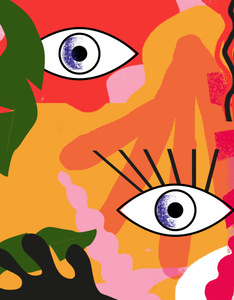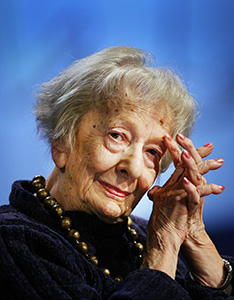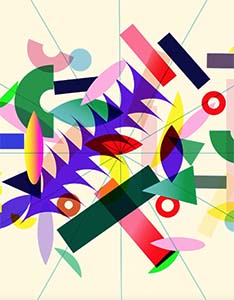“A Brief Vacation” in the Polish Pavilion at the 24th Triennale Milano International Exhibition
On 13 May 2025, the Polish Pavilion will transform into a cozy chamber inspired by a tepidarium—an area in ancient Roman baths designed for relaxation and social gatherings. Curated by Katarzyna Roj, head of “Lifery” at BWA Wrocław, the project brings the concept of a day spa to life, offering a retreat from the fast pace of everyday life and a moment of tranquility amidst the bustle of the event. The Adam Mickiewicz Institute is organizing the Polish Pavilion at the Triennale Milano International Exhibition for the fourth time.
The 24th Triennale Milano International Exhibition
The 24th Triennale Milano International Exhibition, titled “Inequalities”, will take place from 13 May to 9 November 2025 and is dedicated to the issue of the growing inequalities that characterize cities and the contemporary world. Through a series of exhibitions, special projects and public program events, the International Exhibition questions the global challenges related to the differences present in various spheres of existence: from economic to ethnic, from geographic origin to gender. Personalities from the world of art, design, architecture, collectives, cultural institutions, museums and research institutes from around the world are called upon to reflect on the theme with the aim of mapping inequalities and identifying the most advanced political projects for a society in which differences are a resource and a value to be recomposed into new forms of community.
The proejct A Brief Vacation responds to this challenge by highlighting inequalities and disparities in access to rest. The curator Katarzyna Roj emphasizes the need to create a space of comfort that acknowledges the needs of various social groups, particularly those deprived of it: caretakers, exhausted workers, the economically and culturally marginalized, and those on the front lines of wars and disasters. Calmness and time—often absent in contemporary life, especially in the context of the burnout society described by Byung-Chul Han—would define this space.
The exhibition A Brief Vacation at the Polish Pavilion re-establishes comfort through the logic of care, peace, and time—luxuries that have now become inaccessible. Visitors can recline on a meditative bed, where, stimulated by soundscapes, they can reflect on the concept of contemporary hygiene and the urban structures that support it. The project is inspired by the film A Brief Vacation by Vittorio De Sica and the Albergo Diurno Venezia, an underground hotel that served various social classes.
“Just as tuberculosis once influenced Modernist architecture, today’s challenges—such as the pandemic, mass migrations, environmental crises, and planetary exhaustion—are transforming cities and infrastructure, shaping our vision of a regenerative future," writes Katarzyna Roj. “What could social infrastructure look like if it not only supports health but also remains resilient, adapts to urban microclimates, and intertwines bodies with ecosystems? Could it become a caring, joyful, and inclusive sanctuary for a transcultural society in the age of mobility?”
This reflection has led to the creation of the Transsanatorium project—a hybrid space that combines transcultural and interspecific rituals of hygiene and ablution, designed by architect Aleksandra Wasilkowska. As a form of social infrastructure, the Transsanatorium aims to enhance access to sanitation while strengthening the resilience and regeneration of city residents. It envisions a new type of inclusive public space that supports health and social mobility programs.
“We decided to celebrate bodily needs in this increasingly digitalized world” continues Katarzyna Roj. “Transsanatorium, designed by Aleksandra Wasilkowska, is a hybrid structure that emphasizes the collective potential of embodied care, peace, and regenerative rituals. It explores the redistribution of pleasure and immunity by combining functionalism with spirituality in everyday life. It can operate as an independent, small-scale public unit, while also being integrated into urban ecosystems and broader social mobility programs, including healthcare services and international migration policy.”
In search of new forms of urban services
The exhibition A Brief Vacation brings to life the concept of Aleksandra Wasilkowska’s Transsanatorium, not only by showcasing models and visualizations but also by offering a direct experience. A prototype chamber will be constructed within the Polish Pavilion, providing a space for relaxation. Visitors will be invited to rest on a meditation-inducing daybed sculpted by Olaf Brzeski, offering a moment of respite amidst the external hubbub. The relaxation experience will be further enhanced by music composed by Antonina Nowacka, photography by Łukasz Rusznica, and an olfactory composition crafted by Monika Opieka. Choreographer Anna Wysocka will guide visitors through this intimate space, with her movements and moments of stillness revealing the unspoken rhythms and secrets of the Transsanatorium.
According to Aleksandra Wasilkowska’s vision, Transsanatorium could evolve into an urban service of the future: a network of intimate public institutions designed to support regeneration and improve access to sanitation for multi-ethnic urban populations. This system of interconnected urban grottos, inspired by public baths and sanatoriums from various cultures, would offer not only a place for rest but also a symbolic journey through time and climate zones—without ever leaving the city. Transsanatorium could also become a key element of critical urban infrastructure, providing shelter, cooling, and water retention space for public rainwater reservoirs—serving as a solution during droughts and heat waves.
Olga Wysocka, Director of the Adam Mickiewicz Institute, emphasizes that “A Brief Vacation by Katarzyna Roj is a compelling voice in the discussion about the right to rest—a commodity that is becoming increasingly elusive in the realities of the "society of fatigue." The curator thoughtfully and courageously tackles the issue of comfort rooted in peace and time, framing it within the challenges of medicine and hygiene in the 21st century. This is one of the most impactful projects of this year's Triennale Milano International Exhibition.”
Katarzyna Roj collaborates on the exhibition with architect Aleksandra Wasilkowska (the author of the Transsanatorium project) and a team of artists: Olaf Brzeski (sculpture), Łukasz Rusznica (photography), and Agata Bartkowiak (visual communication). The project will also feature Monika Opieka (scent), Alicja Wysocka (choreography), and Antonina Nowacka (sound). BWA Wrocław Galleries of Contemporary Art is a co-organizer of the exhibition.
Polish Artists’ Projects Return to the 24th Triennale Milano International Exhibition
The Triennale Milano International Exhibition is one of the most prestigious international events dedicated to architecture, art, and design. Every three years, the spaces inside the Palazzo dell’Arte, where the event is held, are filled with installations and exhibitions that serve as artistic interventions, seamlessly integrated into the fabric of the historic palace. The Adam Mickiewicz Institute has organized the Polish Pavilion at the Triennale Milano International Exhibition for the fourth time, ensuring the continued presence of Polish architecture and design on the international stage. During the 2022 Triennale Milano International Exhibition, the AMI presented the installation “Greenhouse Silent Disco”, designed by Barbara Nawrocka and Dominika Wilczyńska (Miastopracownia). The installation took the form of a greenhouse, providing direct interaction between humans and plants. It was equipped with digital sensors connected to computer systems that tracked how the plants “responded” to various stimuli, such as human touch or changing atmospheric conditions, offering insights into their needs and reactions.
Polish Design at Milan Design Week
Polish design will be available for exploration starting in April, ahead of the 24th Triennale Milano International Exhibition. This will be made possible through the exhibition “Romantic Brutalism: A Journey into Polish Craft and Design,” organized by the Visteria Foundation during Milan Design Week. Set in a meticulously designed historic apartment in the heart of the city, the exhibition will blend contemporary themes and works by emerging artists with historical references and masterpieces of Polish design.
The 24th Triennale Milano International Exhibition, titled “Inequalities”, will begin on 13 May and will continue until 9 November 2025.
POLISH PAVILION COLOPHON
Curator: Katarzyna Roj
Architect of Transsanatorium: Aleksandra Wasilkowska
Sculptor: Olaf Brzeski
Composer: Antonina Nowacka
Olfactory artist: Monika Opieka
Photographer: Łukasz Rusznica
Choreographer: Alicja Wysocka
Graphic designer: Agata Bartkowiak
Support: Maciej Bujko
Organizer: Adam Mickiewicz Institute
Olga Wysocka, Director
Olga Brzezińska, Deputy Director
Piotr Sobkowicz, Deputy Director
Co-organizer: BWA Wrocław Galleries of Contemporary Art
Production and coordination department: Joanna Andruszko, Tytus Ciski, Natalia Gedroyć, Klaudia Gniady, Tomasz Koczoń, Barbara Krzeska, Malwina Malinowska, Julia Marczuk- Macidłowska, Agata Opieka, Karolina Padło, Marcin Pecyna, Michał Sietnicki, Joanna Sokalska, Francis Thorburn, Julia Wójcik
Co-financed by the Ministry of Culture and National Heritage of the Republic of Poland and Municipality of Wrocław.
Partners: Consulate General of the Republic of Poland in Milan, Polish Cultural Institute in Rome, PFR Nieruchomości part of Polish Development Fund Capital Group
The Adam Mickiewicz Institute (AMI) brings Polish culture to people around the world. Being a state institution, it creates lasting interest in Polish culture and art through strengthening the presence of Polish artists on the global stage. It initiates innovative projects, supports international cooperation and cultural exchanges. It promotes the work of both established and promising artists, showing the diversity and richness of our culture. The Adam Mickiewicz Institute is also responsible for the Culture.pl website, which is a comprehensive source of knowledge about Polish culture. More information: www.iam.pl.
Press contacts :
Thomas Lozinski / Claudine Colin Communication, A Finn Partners Company
+33(0)6 85 98 76 30


